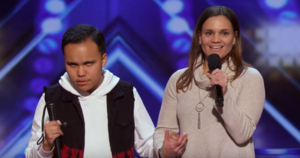The Problem with Disability Representation on America’s Got Talent
by Erin
 Recently, I started a vlog on YouTube sharing my disabled self with my viewers. It is empowering for me to express who I am unabashedly and under my own terms. Even though I can’t physically take the videos myself, I have full control over direction, editing, and scripting. Disabled people rarely have this control in mainstream media, though. Our stories, even on reality shows, are often filtered through an abled and frequently ableist lens.
Recently, I started a vlog on YouTube sharing my disabled self with my viewers. It is empowering for me to express who I am unabashedly and under my own terms. Even though I can’t physically take the videos myself, I have full control over direction, editing, and scripting. Disabled people rarely have this control in mainstream media, though. Our stories, even on reality shows, are often filtered through an abled and frequently ableist lens.
Even when media interviews or features actual disabled people, or consults with us, we are still edited by someone who is probably not disabled themselves. Last week, America’s Got Talent contestant Kodi Lee, who is blind and autistic, shared his amazing talents with the audience. There is no denying he deserved all the “yes” votes from the judges. In an interview after the show, Kodi expressed his excitement at receiving the honor and how he hopes to perform for millions more.
Seeing a disabled person on TV achieving goals is always a good thing. It’s important to see people like you represented and celebrated rather than ignored or demeaned.
So why did the AGT clip of Kodi’s experience not sit right with me, or with numerous other disabled advocates? For many of us, we just want others to view our full selves – as people with talents who are also disabled, rather than talented “despite” our disabilities. We shouldn’t be reduced to feel-good stories when we share our talents. We shouldn’t be met with tears of pity or surprise and “aww” moments when we take center stage. We should be judged the same as abled performers.
I don’t know Kodi’s thoughts about how the show portrayed him. I just wanted him to know that he has value and worth for simply existing, and his talents showed us his heart in the similar way Mariah Carey singing “Hero” makes me tear up.
Some singers show you their soul through their vocals and Kodi has done that. His disabilities have shaped who he is and influence his artistry. He’s not “overcoming” his disabilities when he performs – he is showing them to us alongside his music. And that is a more powerful narrative the show could have pushed rather than the trite saccharine of inspiration. We can and should celebrate disability, not avoid it.
We need more disabled producers, directors, editors, and writers behind the scenes to avoid these tropes. Telling our own stories ensures we are seeing the whole person rather than what abled people want to see or what they expect. Sharing myself on YouTube and seeing other disabled creators on the platform helps disrupt the stereotypes and stigma of disability. I hope, one day, Kodi gets to share his story in his own way too.






